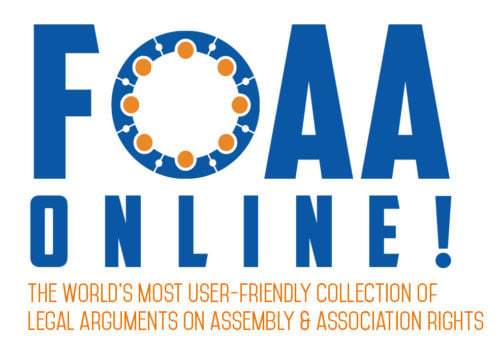This resource provides easily accessible legal arguments that lawyers, activists, and judges can use to protect and promote the freedoms of association and of peaceful assembly (FOAA). It is organized by theme and focuses on the most common restrictions on FOAA around the world. This resource is also available in French and Spanish.
FOAA Online: Resource for Litigation and Advocacy
Each argument is grounded in international law. International law embraces both legally binding obligations under international human rights law and “soft law” interpretations of human rights standards. The resource refers to international treaties, standards and principles emanating from international treaty bodies, the jurisprudence of regional courts, and existing or emerging practice from around the world.
This resource does not seek to provide a comprehensive overview of existing caselaw with respect to the freedoms of association and of peaceful assembly. Instead, the objective is to present a representative range of cases. We also acknowledge that the materials presented are not geographically balanced, which reflects the fact that some mechanisms – notably the European Court of Human Rights – have decided more cases on FOAA than others.
We hope this resource can support your work: from pursuing cases in your domestic legal system to advocating for changes to laws or regulations, to understanding best practices for protecting these vital rights. We welcome your feedback on the site. Please contact us at foaaonline@icnl.org to share any comments or additional resources.

This resource was initially published in April 2017 by Maina Kiai, former United Nations Special Rapporteur on the rights to freedom of peaceful assembly and of association, with support from Heidy Rombouts, in collaboration with Cara Stern, Daniel Simons, Ginna Anderson, Waruguru Kaguongo, Antoine Ledoux and Jeff Vize. The resource on ICNL’s website was supported in part by a grant from the Open Society Foundations.
Sign up for our newsletters
Sign up